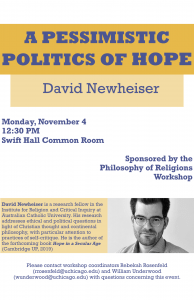John Marvin
MA Student, Philosophy of Religions in the Divinity School
Edward Nelson vs. Arithmetic: God, Iconoclasm, and the (In)consistency of PA
This paper examines the final mathematical work of Edward Nelson, his attempted proof of the inconsistency of Peano arithmetic and primitive recursive arithmetic, fo- cusing on its philosophical framing and its admitted religious motivations with consid- eration of both his theologically adjacent writings and his account of a visionary expe- rience. The paper outlines the mathematical and philosophical significance of Nelson’s attempted proof, and clarifies the relationships among that project, his mathematical formalism, and his religious convictions. The article situates Nelson’s thought in terms of its inheritance from Catholic Aristotelianism, iconoclastic and apophatic discourses, and its relationship to post-20th-century foundational debates. This paper will try to address concerns including: how would one be driven by religious convictions and experiences to heterodox positions in the philosophy of mathematics, and why would one feel it necessary to make dramatic technical discoveries to defend such convictions, as Nelson did? The body of this paper presents Nelson’s work and thought in a man- ner accessible to the engaged mathematical layperson, offering a simplified intuition for keystone ideas from modern logic when necessary, with more rigorous and precise discussions offered for interest and accuracy in frequently referenced appendices. The article is intended to be a comprehensive account of Nelson’s final writings and their reception, providing mathematical specialists with a unified resource for the historical and philosophical details surrounding Nelson’s proof attempt as well as with a lucid but sufficiently technical presentation of the proof’s strategies, and, for scholars in other fields, serving as an introduction to and a vignette of a previously inaccessible, philosophically significant event in very recent mathematical history.
The paper may be accessed here.
Tuesday, November 10th, 12:30 PM
Hosted by the Philosophy of Religions Workshop at the University of Chicago. To RSVP and receive a Zoom link, please email Tyler Neenan (tjneenan@uchicago.edu)
The Workshop on the Philosophy of Religions is committed to being a fully accessible and inclusive workshop. Please contact Workshop Coordinators Rebekah Rosenfeld (rrosenfeld@uchicago.edu) or Tyler Neenan (tjneenan@uchicago.edu) in order to make any arrangements necessary to facilitate your participation in workshop events.

